The 1983 Datsun 720 wasn’t just another pickup truck; it was a statement. Born in an era of automotive innovation, the 720 carved its own path, offering a blend of rugged reliability and surprising versatility that captured the hearts of drivers across the globe.
This truck, with its simple yet elegant design, became a symbol of practicality and durability, leaving an indelible mark on the automotive landscape.
From its boxy exterior to its spacious interior, the 1983 Datsun 720 embodied a timeless design philosophy. Its sturdy construction, coupled with its powerful engine options, made it a favorite for both work and leisure. Whether you were hauling cargo or embarking on weekend adventures, the 720 was ready to tackle any challenge.
Introduction to the 1983 Datsun 720
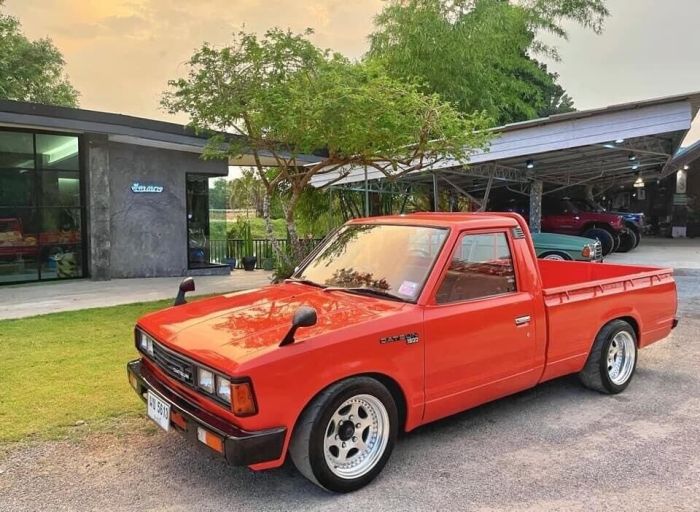
The 1983 Datsun 720 marked a pivotal year in the history of the popular pickup truck, solidifying its position as a reliable and versatile workhorse. It was a time of significant change in the automotive industry, with fuel efficiency and affordability becoming paramount.
The Datsun 720, produced by the Japanese automaker Nissan, successfully navigated these shifting tides, becoming a popular choice for both commercial and personal use.
The 1983 Datsun 720 was a workhorse, known for its reliability and practicality. While it may not have the sleek styling of the 1975 Datsun 260Z , the 720 was a true testament to Datsun’s commitment to building vehicles that could handle the demands of everyday life.
This truck, with its simple design and durable engine, proved to be a popular choice for both businesses and individuals looking for a reliable and affordable vehicle.
Significance within the Datsun/Nissan Lineage
The 1983 Datsun 720 represented a significant evolution in the Datsun pickup truck lineage. It was the last year of production for the 720 nameplate, with Nissan rebranding the model as the Nissan Datsun 720 for the 1984 model year.
This change was part of a broader rebranding effort by Nissan to consolidate its global presence under a single brand name.
Place in the Automotive Market
The 1983 Datsun 720 occupied a unique position in the automotive market, appealing to a diverse range of buyers. It offered a blend of rugged durability, fuel efficiency, and affordability, making it a popular choice for:
- Commercial Use:The Datsun 720 was a reliable workhorse for businesses, particularly in construction, agriculture, and delivery services. Its robust build and payload capacity made it well-suited for demanding tasks.
- Personal Use:The Datsun 720’s versatility and affordability also made it appealing for personal use. It was a popular choice for weekend adventures, hauling gear, and towing small trailers.
The Datsun 720’s success in the market was largely due to its well-rounded features and value proposition. It offered a balance of practicality, affordability, and reliability, making it a compelling choice for a wide range of buyers.
Design and Styling
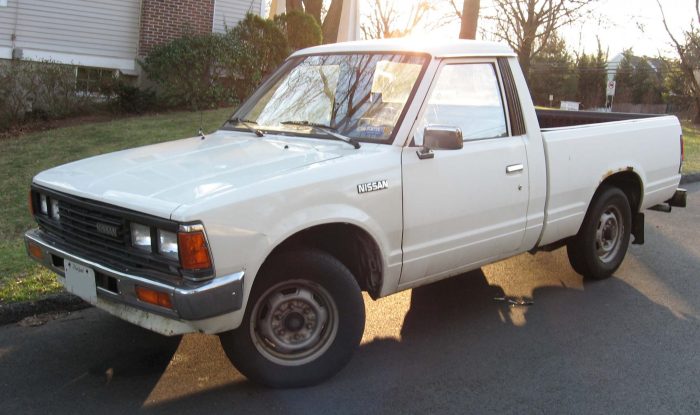
The 1983 Datsun 720 was a pickup truck designed for practicality and affordability, reflecting the design trends of the early 1980s. Its styling was functional, prioritizing utility over flashy aesthetics.
Exterior Design
The 1983 Datsun 720 featured a boxy, angular exterior design common to vehicles of the time. It had a long hood, a short cab, and a large cargo bed. The front end featured a simple grille with a Datsun badge and rectangular headlights.
The side profile was characterized by straight lines and a flat bed, emphasizing practicality and cargo space. The rear end sported a simple tailgate with a Datsun logo and vertically stacked taillights.
Interior Design
The interior of the 1983 Datsun 720 was designed for functionality and durability. The dashboard was straightforward, featuring a simple instrument cluster and basic controls. The seats were comfortable but not overly luxurious, prioritizing practicality over comfort. The interior materials were durable and easy to clean, reflecting the truck’s intended use as a workhorse.
Compared to other vehicles of the time, the 1983 Datsun 720’s interior was relatively spartan, but it was functional and offered ample space for passengers and cargo.
Design Philosophy
The 1983 Datsun 720’s design philosophy emphasized practicality and affordability. The truck was designed to be a reliable and affordable workhorse for businesses and individuals who needed a tough and durable vehicle for hauling cargo. The boxy design, simple interior, and robust construction reflected this design philosophy.
The 1983 Datsun 720 was a prime example of a vehicle that prioritized function over form, reflecting the values of the era.
The 1983 Datsun 720 was a popular choice for its ruggedness and reliability, especially for those seeking a workhorse pickup truck. While the 720 offered a more utilitarian approach, its predecessor, the 1979 Datsun B210 , was a compact and fuel-efficient sedan that gained a loyal following for its affordability and practicality.
Both vehicles represent a testament to Datsun’s legacy of producing vehicles that were both dependable and accessible to a wide range of consumers.
Engine and Performance
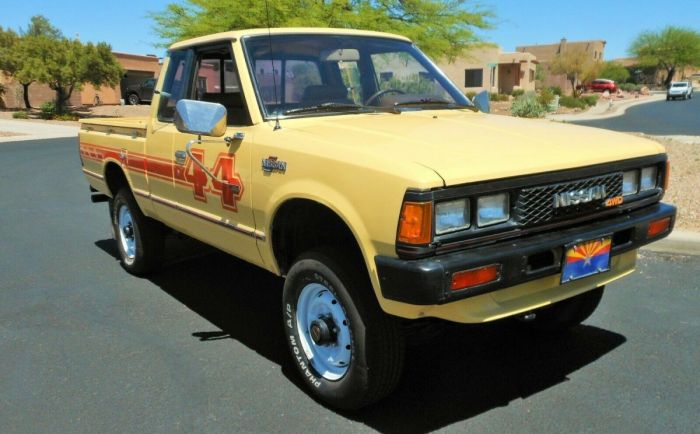
The 1983 Datsun 720 was available with a range of engine options, each catering to different needs and driving styles. These engines provided a balance of power, fuel efficiency, and reliability, making the 720 a popular choice for both work and leisure.
Engine Options and Performance
The 1983 Datsun 720 offered a choice of two petrol engines:
- A 1.6-liter four-cylinder engine, producing 75 horsepower and 89 lb-ft of torque. This engine was known for its fuel efficiency and smooth operation, making it suitable for everyday driving and light hauling.
- A 2.0-liter four-cylinder engine, generating 91 horsepower and 110 lb-ft of torque. This engine provided more power and torque, making it ideal for towing and heavier loads. It also offered a more spirited driving experience.
Driving Experience
The 1983 Datsun 720 provided a comfortable and reliable driving experience. The handling was responsive and predictable, making it easy to maneuver in tight spaces. The suspension was well-tuned to provide a smooth ride on most road surfaces. Acceleration was adequate, particularly with the 2.0-liter engine, allowing for confident merging and overtaking.
“The 1983 Datsun 720 was a capable and versatile vehicle that offered a blend of practicality and performance.” A 1983 Datsun 720 owner review.
Features and Equipment
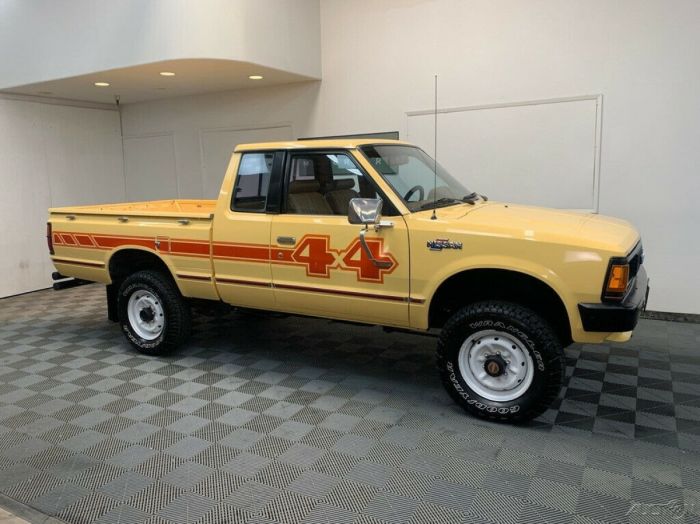
The 1983 Datsun 720 was a versatile pickup truck that offered a range of features and equipment to suit different needs and preferences. From basic work trucks to more luxurious models, the 720 provided a variety of options to enhance comfort, functionality, and style.
The 1983 Datsun 720, while not as flashy as its predecessors, was a reliable workhorse known for its durability and fuel efficiency. It’s a far cry from the sleek, sporty 1974 Datsun 240Z , a car that redefined the sports car market.
But, for those seeking a dependable truck that could handle tough jobs, the 1983 Datsun 720 was a solid choice.
Standard Features, 1983 Datsun 720
Standard features on the 1983 Datsun 720 included a durable and reliable construction, a spacious cabin, and a practical cargo bed.
- Power steering: This feature made maneuvering the truck easier, especially in tight spaces or at low speeds.
- Vinyl upholstery: Durable and easy to clean, vinyl upholstery was a practical choice for a work truck.
- AM radio: Providing entertainment and information on the road, the AM radio was a standard feature for most vehicles in the early 1980s.
- Front disc brakes: This braking system offered improved stopping power and responsiveness compared to drum brakes.
- Rear drum brakes: These brakes provided reliable stopping performance for the rear wheels.
- Steel wheels: Durable and cost-effective, steel wheels were a standard feature on many trucks of the era.
Available Options and Packages
Datsun offered a variety of options and packages to customize the 720 according to individual needs and preferences. These options included:
- Air conditioning: This feature provided comfort and relief from the heat, especially in warmer climates.
- Automatic transmission: This option provided convenience and ease of driving, especially in stop-and-go traffic.
- Power brakes: This feature enhanced stopping performance by reducing the effort required to apply the brakes.
- Vinyl roof: This option added a touch of style and protection from the elements.
- Deluxe interior: This package included upgraded upholstery, carpeting, and trim, enhancing the interior’s comfort and aesthetics.
- Chrome bumpers: These bumpers provided added protection and a more stylish appearance.
- Alloy wheels: These wheels offered a more modern and stylish look compared to steel wheels.
Notable Features
The 1983 Datsun 720 featured some notable features that contributed to its popularity and practicality:
- Spacious cabin: The 720 offered ample space for both the driver and passengers, providing comfort and convenience.
- Practical cargo bed: The truck’s cargo bed provided ample space for hauling goods and materials, making it suitable for various tasks.
- Durable construction: The 720 was built with sturdy materials and a robust frame, ensuring its reliability and longevity.
- Fuel-efficient engine: The 720’s engine was known for its efficiency, providing good fuel economy without compromising performance.
Legacy and Impact
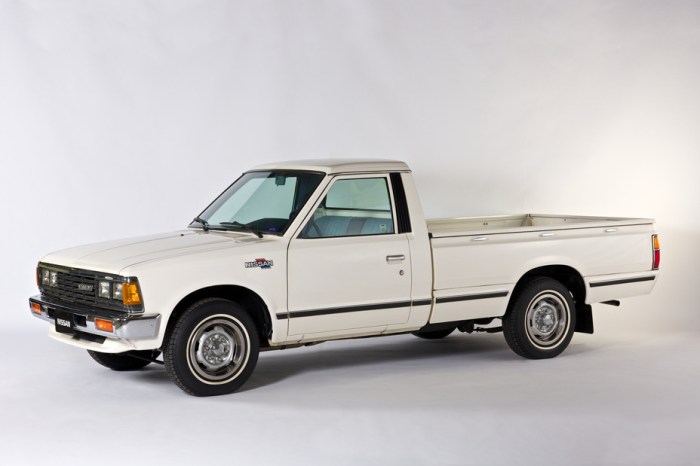
The 1983 Datsun 720 wasn’t just another pickup truck; it marked a significant turning point for the brand and influenced the automotive landscape in several ways. It established Datsun’s reputation for building reliable, durable, and affordable trucks, a legacy that continues to this day.
The 720’s Influence on the Pickup Truck Market
The 1983 Datsun 720’s success was due to its well-rounded design, combining a rugged yet stylish exterior with a practical and comfortable interior. It offered a range of powertrain options catering to various needs, from workhorses to weekend adventurers. Its affordability and reliability made it a popular choice for both businesses and individuals.
The 720’s impact on the pickup truck market is evident in its lasting legacy:
- Increased Competition:The 720’s success prompted other manufacturers to invest in developing more competitive pickup trucks, leading to a rise in innovation and quality within the segment.
- Shifting Consumer Preferences:The 720’s popularity showed that consumers were looking for more than just basic utility in a pickup truck. It highlighted the demand for features like comfort, style, and fuel efficiency, influencing subsequent generations of pickup trucks.
- The Rise of Compact Trucks:The 720’s compact size and versatility paved the way for the growing popularity of compact pickup trucks. It demonstrated that a smaller truck could still offer ample utility while being more fuel-efficient and maneuverable in urban environments.
The 720’s Legacy in Nissan’s Lineup
The 1983 Datsun 720’s success laid the groundwork for Nissan’s continued dominance in the pickup truck market. The 720’s design cues, engineering principles, and focus on practicality and reliability were carried over to subsequent models like the Datsun/Nissan Hardbody and the Frontier, ensuring their success and further solidifying Nissan’s reputation in the segment.
The 720’s Place in Car Culture
The 1983 Datsun 720’s influence extends beyond its commercial success. It has become a cherished vehicle among enthusiasts and collectors, appreciated for its timeless design, durability, and potential for customization. The 720 has become a symbol of a bygone era, reminding us of a time when trucks were simple, reliable, and built to last.
It’s often featured in car shows, rallies, and online communities, where owners share their experiences and stories about their beloved 720s.
Ownership and Maintenance
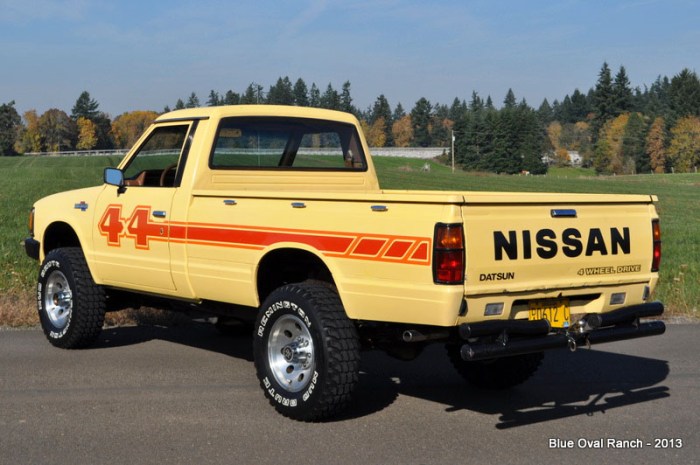
The 1983 Datsun 720, a reliable and robust truck, offers a compelling value proposition for those seeking a workhorse with a touch of vintage charm. However, like any vehicle, ownership comes with certain financial considerations and potential maintenance challenges. This section delves into the costs associated with owning and maintaining a 1983 Datsun 720, common issues that owners may encounter, and practical advice for finding a well-maintained example.
Cost of Ownership
The cost of owning a 1983 Datsun 720 varies significantly based on factors such as location, vehicle condition, and usage patterns. However, some general estimates can provide a baseline understanding.
- Purchase Price:Depending on the condition and modifications, a 1983 Datsun 720 can range from a few hundred dollars for a project vehicle to several thousand dollars for a well-maintained example.
- Insurance:Insurance costs for a 1983 Datsun 720 are typically low, especially if it’s used as a personal vehicle. However, insurance premiums can vary based on factors such as the driver’s age, driving record, and location.
- Fuel Efficiency:The 1983 Datsun 720, with its 2.0-liter four-cylinder engine, offers decent fuel economy, especially when compared to larger trucks of the same era. However, fuel prices fluctuate, and mileage can vary based on driving habits and vehicle condition.
- Maintenance:Maintenance costs are generally affordable, especially for routine services. However, unexpected repairs can occur, and the cost of parts and labor may vary depending on the location and the severity of the issue.
Common Issues and Repairs
The 1983 Datsun 720 is known for its reliability, but like any vehicle, it can experience issues over time. Some common issues include:
- Engine:While the 2.0-liter four-cylinder engine is generally robust, it can develop issues such as oil leaks, worn valve seals, or a failing timing chain.
- Transmission:The four-speed manual transmission is known for its durability, but the automatic transmission can experience issues such as slipping or rough shifting.
- Rust:Vehicles from this era are susceptible to rust, particularly in areas prone to salt and moisture. Inspecting for rust, especially in the body panels, frame, and undercarriage, is crucial.
- Electrical System:Older electrical components can experience issues such as faulty wiring, corroded connections, or malfunctioning sensors.
- Suspension:The suspension system can wear out over time, leading to issues such as worn bushings, ball joints, or shocks.
Finding a Good Example
When searching for a 1983 Datsun 720, it’s essential to approach the process with a discerning eye. Here are some tips:
- Inspect the Vehicle Thoroughly:Examine the body for rust, dents, and scratches. Check the engine for leaks, smoke, and unusual noises. Inspect the interior for wear and tear.
- Test Drive:Take the vehicle for a test drive to assess its performance, handling, and braking. Pay attention to any unusual noises or vibrations.
- Check the Maintenance History:Request maintenance records from the seller. This can provide valuable insights into the vehicle’s history and any potential issues.
- Consider a Pre-Purchase Inspection:Have a qualified mechanic inspect the vehicle before purchasing. This can help identify any potential problems and ensure you’re making an informed decision.
- Research Market Values:Use online resources like Kelley Blue Book or NADA Guides to research market values for 1983 Datsun 720s. This will help you determine a fair price.
Ultimate Conclusion: 1983 Datsun 720
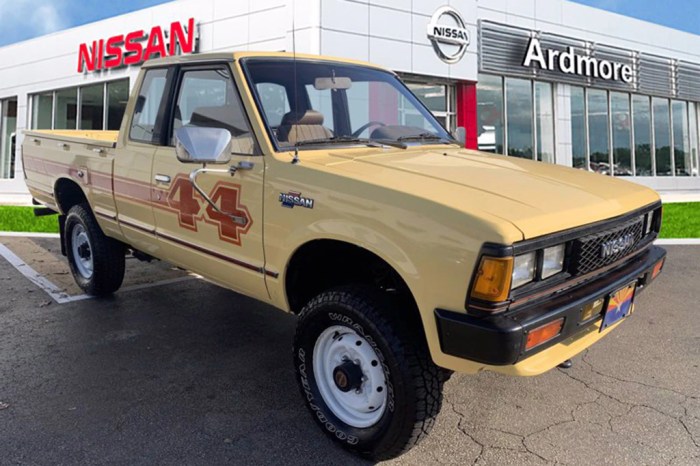
The 1983 Datsun 720, though a product of its time, remains a testament to the enduring power of a well-crafted vehicle. Its legacy lives on, not only in the memories of its owners but also in the DNA of the trucks that followed.
For those seeking a reliable and capable workhorse, the 720 continues to be a sought-after classic, reminding us that sometimes, simplicity and functionality are all you need.